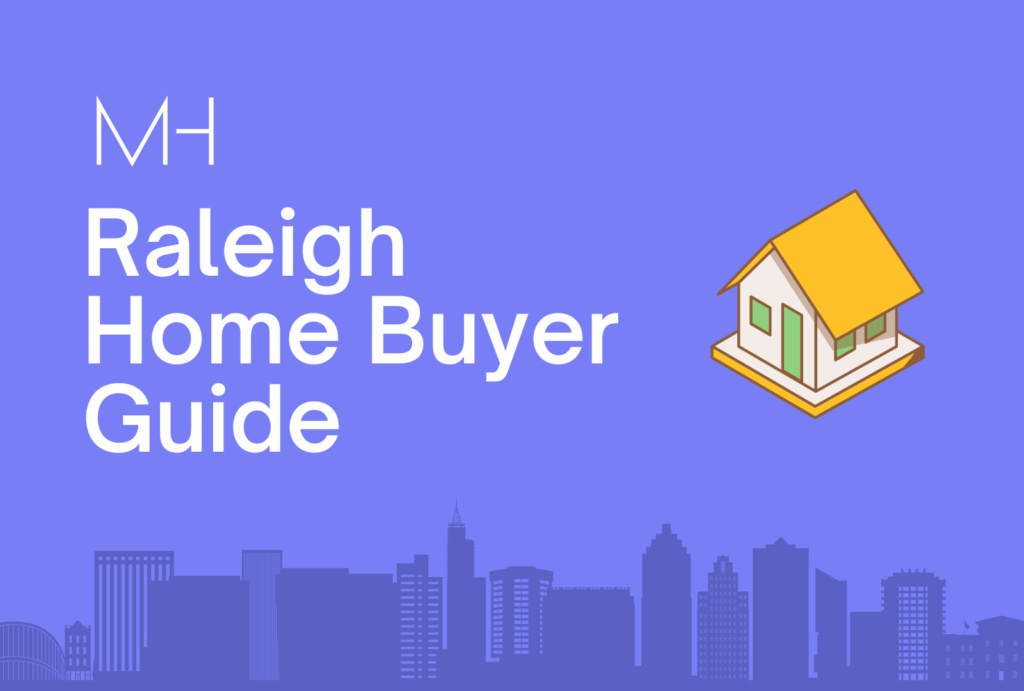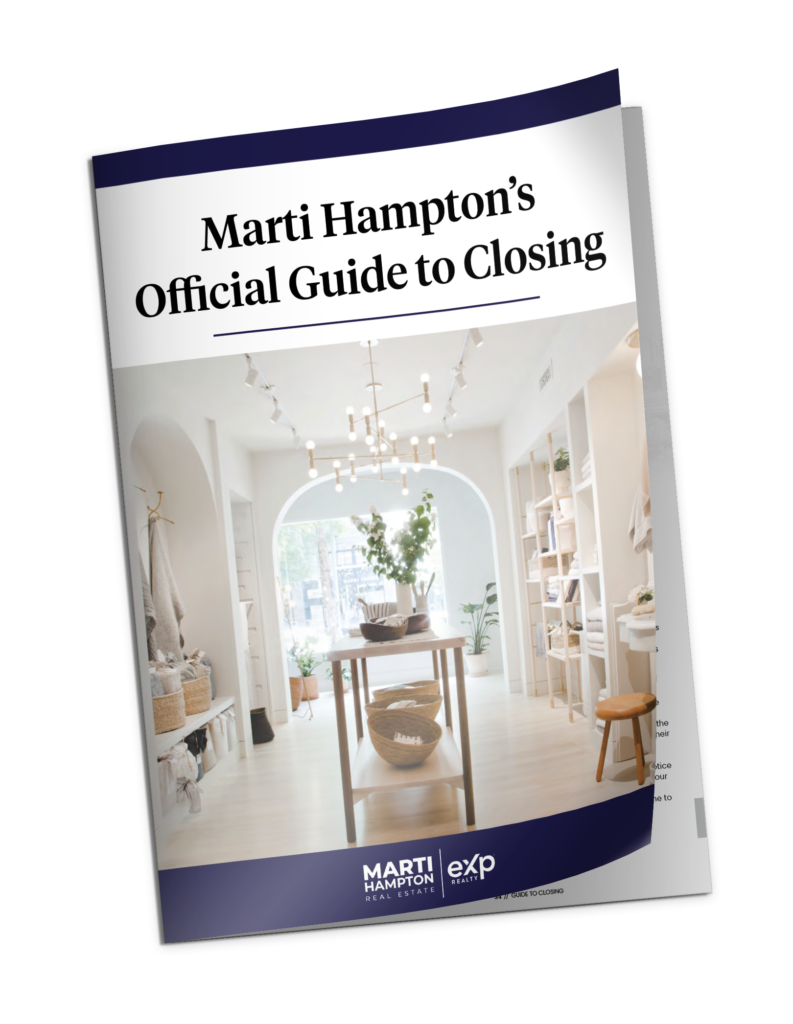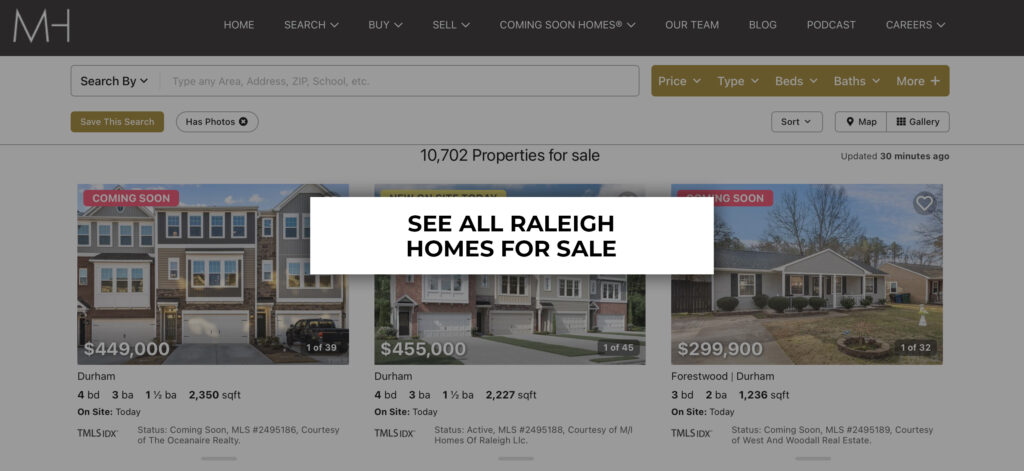Raleigh Home Buyer Guide
Buying a home is a big step.
It usually represents your single biggest investment — and debt. On top of that, it is often one of the most intimidating experiences that one can go through.
That demands strong advice, strategies and financial programs from a knowledgeable real estate team.
Before you start searching for homes, learn all you can about buying a home with this handy guide.
If you’re a first-time homebuyer in Raleigh, reach out to our team for help!

1. Understanding Your 'Why'.
Before you begin your home search, it’s important to come to terms with your ‘why’. It sounds silly, but a lot of people don’t actually take the time to really consider why they want to buy a house in the first place.
• Is it homeownership? Owning a home Is often seen as a symbol of stability and independences. Plus, not having to pay rent is always a plus.
• Is it an investment? Buying a home is often considered a significant long-term investment, as it has the potential to appreciate in value over time.
• Is it a lifestyle? A home can provide a personal space for families and individuals to live, grow, and create memories. Are you looking for desirable amenities? Schools?
When you are finding your ‘why’, analyze your specific needs, budget, and any other personal preferences including anticipated changes in your life. All of these will impact the purchase of your home.
2. Securing Your Financing
The next step on your home buying journey is to evaluate your financial situation and confirm your budget.
Following these measures will help you to conduct your home search with confidence, and allow your agent to best negotiate for your desired home.
___
• Determine your budget and downpayment: How much real estate can you afford? How much real estate can you afford? In deciding how big a loan to take, you’ll want to look at the house’s total cost, not just the monthly mortgage payment. Consider how high the property taxes are in your chosen neighborhood, how much homeowners insurance will cost and how much you anticipate spending to maintain or improve the house.
As a general guideline, your total monthly housing costs —including mortgage payments, taxes, insurance, fees, utilities and interest — should not exceed about 25% of your gross monthly household income.
If your down payment amount is less than 20 percent of the total purchase price, you will need to purchase mortgage loan insurance that guarantees the debt against default. In most cases, this is added to the mortgage loan.
___
• Check your credit score: Your credit report is an important aspect of the mortgage approval process and in determining the interest rate that a lender offers you. Before getting in contact with a potential lender, you may wish to confirm your credit rating, so that you have time to resolve outstanding issues.
The five factors that determine your credit score include:
• Payment History (35%): A history of making your bill payments on time
• Outstanding Credit Balances (30%): The amount you owe relative to the total amount of credit available
• Length of Credit History (15%): The age of your credit lines — the longer your credit history, the better
• Type of Credit (10%): Your current mix of credit cards, retail accounts, and finance/mortgage loans. A diverse mix of credit is best
• Inquiries (10%): How many credit applications you’re filling out. Multiple credit report inquiries can lower your score
___
• Get pre-approved: Your buyer’s agent at Marti Hampton can connect you to qualified professionals to get your loan handled efficiently and effectively.
A mortgage pre-approval is based on a preliminary review of credit information and is not a commitment to lend. Lenders will offer a loan commitment upon verification of application information. The preliminary approval will let you know the maximum loan amount for which you may qualify. With your application, credit check and first loan decision phase already complete, you are seen as a serious homebuyer.
To get pre-qualified, you must provide the following information to your lender:
• Copy of your driver’s license
• Last 2 years of W-2 statements from your employer
• Last 30 days worth of paystubs
• Last 2 months of checking/savings statements — all pages
Also helpful if applicable:
• Last 2 years’ individual tax returns — all pages and schedules
• Last quarter of stocks/bonds/mutual funds/401K — all pages
• College transcripts (if graduated in the last 2 years)
___
Tips for a smooth loan approval:
• DO: Continue to make your mortgage or rent payments on time
• DO: Stay current on all your existing accounts
• DO: Keep working at your current employer
• DO: Keep your same insurance company
• DO: Continue living at your current residence
• DO: Continue to use your credit as normal
• DO NOT: Make a major purchase (car, jewelry, etc.)
• DO NOT: Apply for or open a new credit card
• DO NOT: Change jobs without first notifying lender
• DO NOT: Transfer any balances from one account to another
• DO NOT: Buy any furniture on credit
• DO NOT: Close any credit card accounts
• DO NOT: Open a new cell phone account
• DO NOT: Take out a new loan or start any home improvement projects
3. Discover Raleigh Home Loan Programs
Buying a home can be both exciting and daunting. Many disappointed home buyers are now renting or feeling tapped out of the market by the high down payments of competing home buyers and higher interest rates.
The cost of a down payment and the need for a good credit score can often feel like an insurmountable obstacle, but the truth is that there are many loan options available that can help make the dream of homeownership a reality. There is new hope and new opportunities on the horizon!
Let’s begin with one such option. Down payment assistance loans. These loans are specifically designed to help buyers with a low-down payment. Many programs exist at the local and state level, and they can help cover a portion or even all of the down payment, making it much more affordable to buy a home.
Raleigh Down-Payment Assistance Loans:
Down Payment Grant
• Offering up to $12,500 or 4% of the purchase price towards down payment & closing costs!
• Conventional loan program.
• First-time home buyers.
• Primary residence only.
• 620+ credit score.
• Up 50 50% debt-income ratio
• Income capped at approx. $88,000 — borrower only, no household.
• 5 years forgivable — 20% per year, fully forgiven after 5 years.
FHLBank Atlanta’s First-Time Homebuyer Product (FHP)
• Up to $7,500 in funds for the down payments and closing costs of first-time home buyers.
• The home buyer must contribute at least $1,000.
• Purchase home must be used as the homebuyer’s primary residence.
• Income and other eligibility requirements apply.
• Funds are available on a first-come, first-serve basis.
Chenoa Fund Down Payment Assistance
• FHA loan program.
• 100% financing (down payment covers the 3.5%).
• Does not need to be first time home buyer.
• No income limits.
• FICO 600 minimum.
3% Down Conventional
• Fannie Mae Standard does not require first time home buyer. No income limit.
• HomeReady mortgage income limit: 80% Area Median income. Do not need to be a first time home buyer.
• Lower rate options if one of the borrowers is a first time home buyer.
• 620 minimum credit score.
Raleigh VA Loans:
Thankfully, VA loans are making a comeback in many areas. During the latest season in real estate when home values exploded due to low rates and an undersupply of homes, both VA and FHA offers were practically nonexistent and rarely accepted. This is now a favorable time to get back to the loans that many Americans used to buy their first home.
Veterans can take advantage of “no down payment” for their military service sacrifice. They typically require a lower down payment than traditional mortgages and can be a great option for first-time home buyers or those with limited savings.
Raleigh Low Credit Home Buying Loans:
Don’t feel that it’s hopeless if your credit score has been less than sterling. There are loans available for buyers with lower credit scores. This is a good time to take out all the stops and see if one of our loans that requires a lower credit score than the traditional 700ish range.
While having a good credit score is important when applying for a mortgage, it’s not the only factor considered. Many lenders offer programs for buyers with less-than-perfect credit, and these loans can often have more flexible terms and lower interest rates.
NC Housing
• $8,000 down payment assistance.
• Must be first time home buyer.
• Income limits are based on entire household income.
• Sale price limitation of $385,000.
• Conventional or FHA.
• 640 FICO minimum.
NC Advantage
• 3% down payment assistance.
• Do not need to be a first time home buyer.
• Income limits based on mortgage applicant only.
• No sales price limit
• Conventional or FHA
• 640 FICO minimum.
Affordable Housing Program
• Provides low-to-moderate income families and individuals with a grant.
• $12,500 for first time home buyers.
• OR $15,000 for “community partners” – current or retired essential workers (law enforcement, educators, health care workers, firefighters, first responders, veterans and active-duty military, or their surviving spouses)
• 640 FICO minimum.
FHIC Wake County Affordable Homeownership Program
• Grant for low to moderate income first time home buyers or current homeowners to avoid foreclosure.
• Forgivable one time loan up to $50,000 with no monthly payment.
• Household income at or below 80% area median income.
• 45% max DTI.
• No maximum sales price.
• Not available for homes inside Raleigh or Cary city limits. Eligible cities/townships: Apex, Fuquay-Varina, Garner, Holly Springs, Knightdale, Morrisville, Rolesville, Wake Forest, Wendell, Zebulon.
• Minimum 640 credit score.
Asset Depletion Program
• Asset depletion income can be coupled with other income. Two years of tax returns are still required on the loan.
• Maximum 80% LTV for primary and secondary homes. Maximum 60% LTV for NOO.
• All collateral types and occupancy including second home and investment properties allowed.
• Will use all eligible assets for the program at 100% face value if borrowers are 59 1/2 and older.
• Retirement funds are calculated at 50% of face value if borrowers are less than 59 1/2.
• Assets held in annuities and cash value of life insurance policies are ineligible for the asset depletion program.
• 600 minimum credit score.
Chenoa Fund Down Payment Assistance
• FHA loan program
• 100% financing (down payment covers the 3.5%)
• Does not need to be first time homebuyer
• No income limits
• 600 minimum credit score.
Raleigh Investor Loan Programs:
In years past, investor loans have notoriously been difficult to obtain and only went to large investors. That has changed!
Now you can begin investing in real estate with an investor loan and a credit score as low as 640! This is an amazing opportunity to own income-producing property. Many new investors are buying beach properties or mountain homes to use as Airbnbs. But there are also buyers that simply want a second home loan. Here are our picks for the best investor loans and second home mortgages:
Investor DSCR Loans – Debt Service Coverage Ratio
• This is a loan to help investors purchase homes but using the potential rental income.
• No traditional income documentation required.
• No limit to the number of properties owned.
• Can be interest-only.
• LTVs vary based on credit and rent-to-payment ratio.
• 640 minimum credit score.
ITIN Loans
• Primary or secondary homes or NOO occupancies.
• Up to max 80% LTV.
• Minimum loan amount $150,000.
• Maximum loan amount $1,500,000.
• Max DTI 43%,
• SFR, PUDs, warrantable condos & 2-4 units eligible.
• 640 minimum credit score.
Raleigh Self-Employed Home Loan Programs:
What about the self-employed borrower who wants to buy a home? We are realtors, after all, and are self-employed!
12 Month Bank Statement Program
• One of the borrowers must be self-employed.
• 12 consecutive months of bank statements needed.
• Can use either business or personal bank statements. However, borrower must have a business account.
• Business must have been open for at least 2 years.
• Max DTI 50%.
• Condo lending available on this program.
Raleigh Renovation Loan Programs:
What if you are a home buyer, but your potential homes you can be always seem to need an updated kitchen or bath? We have a great option for a renovation loan, and it even goes as low as a 620 minimum credit score. Talk about sweat equity!
Renovation Loan
• Loan based on post-renovation value of the home.
• 620 minimum credit score.
• 97% loan to value.
• Max DTI 45%.
Raleigh Traditional Home Loan Programs:
Do not overlook all of the traditional loans available! For instance, the 2-1 buy-down loan has been popular because home buyers who expect rates to come down love the lower rates for the first and second year of the mortgage.
2-1 and 1-0 Buy-Down Home Loan
• Purchases only.
• Temporarily reduces rate for either first year (1-0) or first 2 years (2-1).
• Example: If rate is 6% on a 2-1 buy-down, then the first year is 4% and the second year is 5%. The third to thirtieth years are at 6%.
• Buyers can refinance anytime with no pre-payment penalties.
• Must be on primary residence.
• With our choice of lender – BOTH the seller and the buyer can contribute to the buy-down as well as the lender and even the realtor.
• Note: Must quality at higher long-term rate.
Conventional Home Loan
• Minimum down payment is 3%.
• PMI is required on any down payment less than 20% (can be paid monthly, upfront, or even lender paid).
• Loan term can be 10, 15, 20, or 30 years.
Here’s a little extra motivation to get going on homeownership!
For a limited time, if you go through one of the loan programs outlined in this article, we will gift you a $300 gift for your new home if you allow us to document your successful journey.
That means that if you take the time to speak to one of our lenders and get approved, we will give you a housewarming gift of $300 for anything for your new home!
See If You Qualify for These Loans
If any of the above loans are of interest to you, check below to see if you qualify. We’ll reach back out to you within 1 business day, along with the loan type and amount for which you qualify!
4. Search & Tour Homes with Your Agent
Once your Marti Hampton agent has an understanding of your property needs and preferences, they will begin the home search process along with you.
The best part? Working with our team grants you access to pre-market and office exclusive homes that you will not see available anywhere else on the market.
___
• ComingSoonHomes.com: Exclusive to the Marti Hampton Team, ComingSoonHomes.com is an award-winning website that helps nationwide home buyers find homes weeks and months before they become active on the market.
We know how difficult it can be to find a prospect in time to make an offer. With alternative home inventory and new home construction struggling with the uphill task of servicing the need for lack of inventory, it is more important than ever to know about real estate before it is ready for showings. This gives you, the home buyer, more time to research, prepare, and plan for once the home you have your heart set on actively hits the market.
• Office Exclusives: In the Raleigh area, homes can be sold within days, or even hours, of being put on the market. Others are marketed and sold within a real estate brokerage’s network without ever being made available to the public. Your agent at Marti Hampton can arrange for advance access to properties that are represented within our exclusive professional networks.
• Immediate Alerts: Properties are put on the market via MLS (multiple listing service) each day. As soon as a property that meets your criteria is posted on the MLS, your agent will receive an immediate alert. They will then share the property with you and you can decide if you’d like to arrange a private tour.
5. Submit Your Offer
You’ve found your dream home!
Now what?
You’ll make an offer by submitting a signed real estate offer to the seller and seller’s listing agent. It is important that you meet with your agent (and, if needed, an attorney) to prepare your offer. Real estate laws vary widely throughout regions, and it is essential that you protect your legal interests and account for contingencies unique to the property.
• Market Value: Before making an offer on a house, you should have a good idea of its market value. What are comparable properties selling for in the area? How long has the house been on the market? Do major systems require updating? Your buyer’s agent will help you to weight all of these factors in your offer.
• Legal and Contractual Obligations: An offer commits you to certain obligations as soon as the other party accepts it. Prior to submitting an offer, always review all terms with your buyer’s agent (and attorney, if applicable) to ensure that you are clear on the legal obligations should the offer be accepted by the seller.
• Offer Details: The details of an offer typically include:
• Your legal name and that of the vendor
• The address of the property
• The price you are offering to pay
• Inclusions (items in or around the home that you think are included in the sale such as appliances, light fixtures or window coverings)
• Amount of your deposit
• The dates that you take legal and physical possession of the home
• Legal subjects or conditions upon which the contract becomes final
• The date the offer expires
6. Negotiations
Following submission of your offer, you and your agent should be prepared for negotiations. Buying price may be negotiated, as well as any deposits, inclusions, dates and deadlines.
After we present your offer to the listing agent, it will either be accepted, rejected, or the seller will make a counter-offer. This is when we will use our market knowledge and skills to negotiate the terms of the contract on your behalf.
___
• Multiple Offers: If there is high demand but low inventory, you may find yourself in a bidding war against other buyers. Some sellers may also intentionally list their home at a relatively low price in order to stimulate multiple offers.
Sellers have several ways to deal with multiple offers. Sellers can accept the “best” offer; they can inform all potential purchases that other offers are “on the table”; they can “counter” one offer while putting other offers to the side awaiting a decision on the counter-offer; or they can “counter” one offer and reject the others.
There are advantages and disadvantages to the various negotiating strategies employed in multiple offer situations. A low initial offer may result in buying the property you desire for less than the listed price – or it may result in another buyer’s higher offer being accepted.
On the other hand, a full price offer may result in paying more than the seller might have required. Your buyer agent will explain the pros and cons of these negotiating strategies. The decisions, however, are yours to make.
Woohoo! You're Under Contract!
...Now what?
…Now this! Grab your copy of:
Marti Hampton’s Official Guide to Closing
Appraisals. Walkthroughs. Inspections. Complete your home buying journey with a copy of Marti Hampton’s Official Guide to Closing.

Questions about buying your home in Raleigh?
Our team holds over 35 years of experience representing Raleigh home buyers.
Reach out to us at [email protected] or 919-601-7710 for any and all questions pertaining to your home search.

